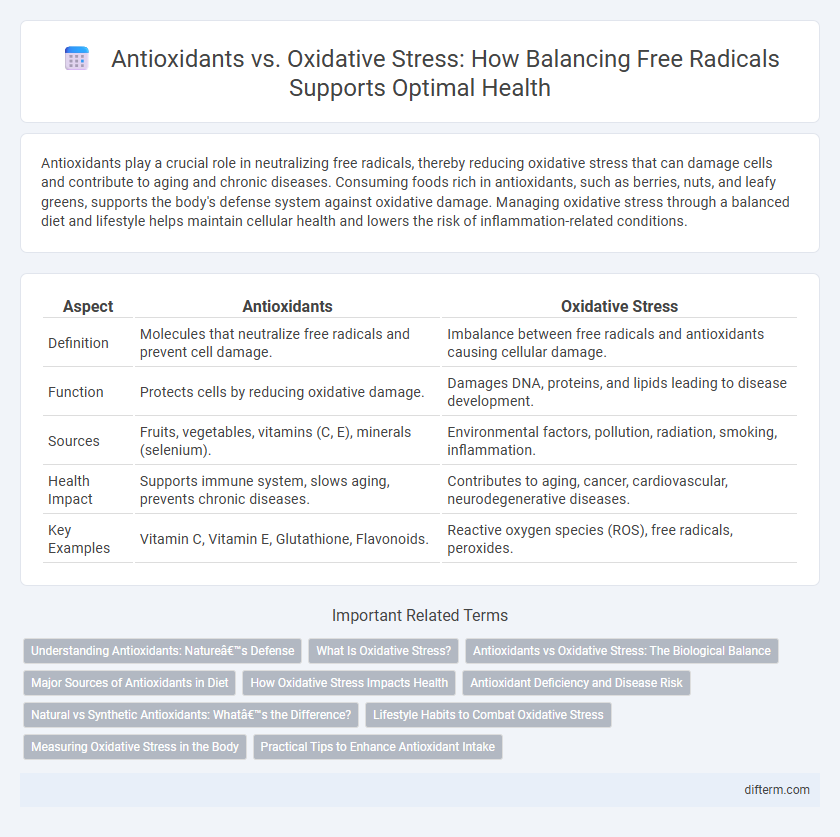Antioxidants play a crucial role in neutralizing free radicals, thereby reducing oxidative stress that can damage cells and contribute to aging and chronic diseases. Consuming foods rich in antioxidants, such as berries, nuts, and leafy greens, supports the body's defense system against oxidative damage. Managing oxidative stress through a balanced diet and lifestyle helps maintain cellular health and lowers the risk of inflammation-related conditions.
Table of Comparison
| Aspect | Antioxidants | Oxidative Stress |
|---|---|---|
| Definition | Molecules that neutralize free radicals and prevent cell damage. | Imbalance between free radicals and antioxidants causing cellular damage. |
| Function | Protects cells by reducing oxidative damage. | Damages DNA, proteins, and lipids leading to disease development. |
| Sources | Fruits, vegetables, vitamins (C, E), minerals (selenium). | Environmental factors, pollution, radiation, smoking, inflammation. |
| Health Impact | Supports immune system, slows aging, prevents chronic diseases. | Contributes to aging, cancer, cardiovascular, neurodegenerative diseases. |
| Key Examples | Vitamin C, Vitamin E, Glutathione, Flavonoids. | Reactive oxygen species (ROS), free radicals, peroxides. |
Understanding Antioxidants: Nature’s Defense
Antioxidants are molecules that neutralize free radicals, preventing cellular damage caused by oxidative stress, a condition linked to aging and chronic diseases. Key antioxidants include vitamins C and E, selenium, and flavonoids, found naturally in fruits, vegetables, nuts, and seeds. Understanding antioxidants enhances the ability to combat oxidative stress, supporting overall health and reducing the risk of inflammation-related illnesses.
What Is Oxidative Stress?
Oxidative stress occurs when there is an imbalance between free radicals and antioxidants in the body, leading to cellular damage. Free radicals are unstable molecules that can harm DNA, proteins, and lipids, contributing to aging and various diseases like cancer and cardiovascular conditions. Understanding oxidative stress is crucial for developing strategies to enhance antioxidant defenses and protect against chronic health disorders.
Antioxidants vs Oxidative Stress: The Biological Balance
Antioxidants neutralize free radicals, preventing cellular damage caused by oxidative stress, which is linked to aging and chronic diseases. The biological balance between antioxidants and oxidative stress is crucial for maintaining cellular health and reducing inflammation. Enhancing antioxidant intake through foods rich in vitamins C and E, selenium, and flavonoids supports the body's defense mechanisms against oxidative damage.
Major Sources of Antioxidants in Diet
Major sources of antioxidants in the diet include colorful fruits such as berries, oranges, and grapes, which are rich in vitamin C and flavonoids. Leafy green vegetables like spinach and kale provide high levels of beta-carotene and vitamin E, essential for neutralizing free radicals. Nuts, seeds, and green tea also contribute significantly through compounds like selenium and polyphenols, supporting the body's defense against oxidative stress.
How Oxidative Stress Impacts Health
Oxidative stress results from an imbalance between free radicals and antioxidants, leading to cellular damage that contributes to chronic diseases like cancer, cardiovascular disorders, and neurodegenerative conditions. Elevated oxidative stress damages DNA, lipids, and proteins, impairing cellular function and accelerating aging processes. Effective levels of antioxidants, such as vitamins C and E, glutathione, and polyphenols, are essential to neutralize free radicals and mitigate oxidative damage, promoting overall health and longevity.
Antioxidant Deficiency and Disease Risk
Antioxidant deficiency impairs the body's ability to neutralize free radicals, leading to increased oxidative stress that damages cells and tissues. This imbalance is linked to a higher risk of chronic diseases such as cardiovascular disease, cancer, and neurodegenerative disorders. Maintaining adequate levels of antioxidants through diet or supplementation is crucial for mitigating oxidative damage and supporting overall health.
Natural vs Synthetic Antioxidants: What’s the Difference?
Natural antioxidants, found in fruits, vegetables, and whole grains, are rich in vitamins like C and E, flavonoids, and carotenoids that neutralize free radicals and reduce oxidative stress effectively. Synthetic antioxidants, such as BHT and BHA, are artificially produced compounds used in food preservation but may carry potential health risks with long-term exposure. The effectiveness and safety of natural antioxidants make them preferable for combating oxidative stress compared to synthetic alternatives.
Lifestyle Habits to Combat Oxidative Stress
Incorporating antioxidant-rich foods such as berries, nuts, and leafy greens into daily meals helps neutralize free radicals, reducing oxidative stress. Regular physical activity and adequate sleep enhance the body's natural defense mechanisms against oxidative damage. Avoiding smoking and excessive alcohol consumption further supports maintaining cellular health and preventing chronic diseases linked to oxidative imbalance.
Measuring Oxidative Stress in the Body
Measuring oxidative stress in the body involves assessing biomarkers such as malondialdehyde (MDA), 8-iso-prostaglandin F2a (8-iso-PGF2a), and oxidized glutathione (GSSG), which indicate lipid peroxidation and cellular damage levels. Antioxidant capacity is evaluated through assays like total antioxidant capacity (TAC) and superoxide dismutase (SOD) activity, reflecting the body's defense against free radical-induced oxidative damage. Accurate measurement of these parameters is critical for understanding the balance between oxidative stress and antioxidant protection in chronic diseases and aging.
Practical Tips to Enhance Antioxidant Intake
Increasing the consumption of antioxidant-rich foods such as berries, nuts, dark leafy greens, and citrus fruits can significantly reduce oxidative stress by neutralizing free radicals in the body. Incorporating a variety of colorful vegetables, green tea, and spices like turmeric into daily meals boosts antioxidant levels, enhancing cellular protection and overall health. Supplementing with vitamins C and E and polyphenols under medical guidance further supports the reduction of oxidative damage and promotes metabolic balance.
Antioxidants vs Oxidative Stress Infographic

 difterm.com
difterm.com